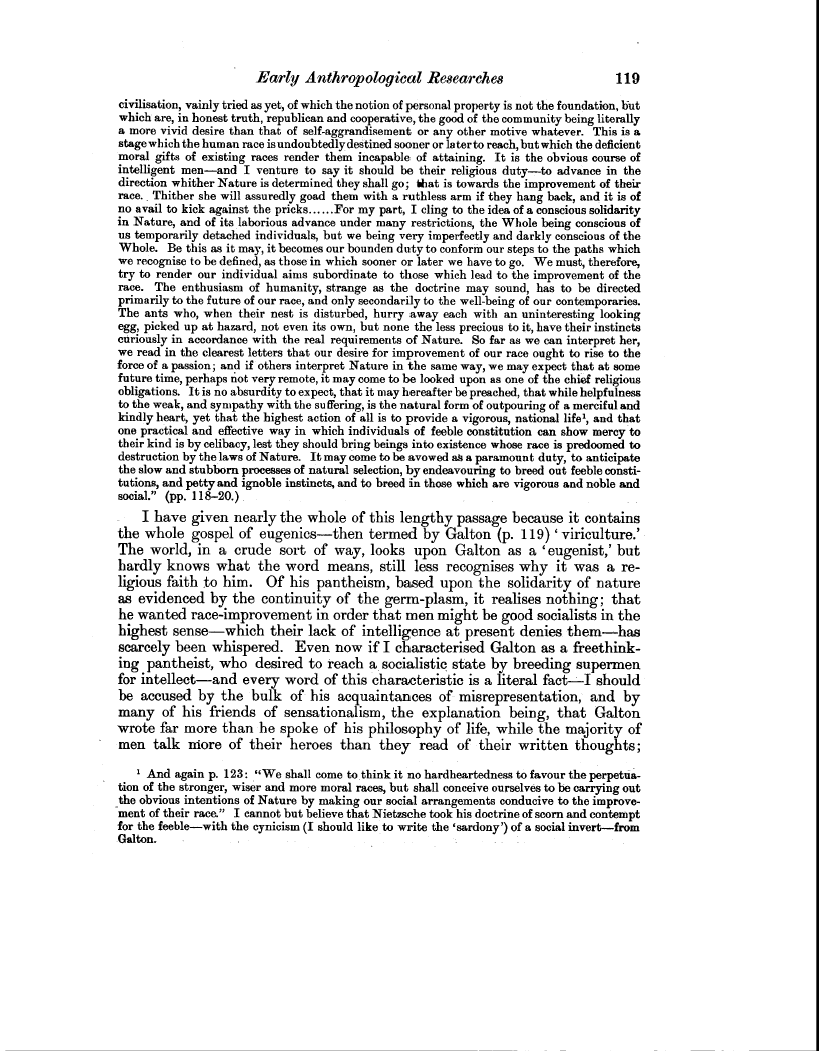Early Anthropological Researches 119
civilisation, vainly tried as yet, of which the notion of personal property is not the foundation, but which are, in honest truth, republican and cooperative, the good of the community being literally a more vivid desire than that of self-aggrandisement or any other motive whatever. This is a stage which the human race is undoubtedly destined sooner or laterto reach, but which the deficient moral gifts of existing races render them incapable of attaining. It is the obvious course of intelligent men-and I venture to say it should be their religious duty-to advance in the direction whither Nature is determined they shall go; chat is towards the improvement of their race. , Thither she will assuredly goad them with a ruthless arm if they hang back, and it is of no avail to kick against the pricks For my part, I cling to the idea of a conscious solidarity in Nature, and of its laborious advance under many restrictions, the Whole being conscious of us temporarily detached individuals, but we being very imperfectly and darkly conscious of the Whole. Be this as it may, it becomes our bounden duty to conform our steps to the paths which we recognise to be defined, as those in which sooner or later we have to go. We must, therefore, try to render our individual aims subordinate to those which lead to the improvement of the race. The enthusiasm of humanity, strange as the doctrine may sound, has to be directed primarily to the future of our race, and only secondarily to the well-being of our contemporaries. The ants who, when their nest is disturbed, hurry away each with an uninteresting looking egg, picked up at hazard, not even its own, but none the less precious to it, have their instincts curiously in accordance with the real requirements of Nature. So far as we can interpret her, we read in the clearest letters that our desire for improvement of our race ought to rise to the force of a passion; and if others interpret Nature in the same way, we may expect that at some future time, perhaps not very remote, it may come to be looked upon as one of the chief religious obligations. It is no absurdity to expect, that it may hereafter be preached, that while helpfulness to the weak, and sympathy with the suffering, is the natural form of outpouring of a merciful and kindly heart, yet that the highest action of all is to provide a vigorous, national life', and that one practical and effective way in which individuals of feeble constitution can show mercy to their kind is by celibacy, lest they should bring beings into existence whose race is predoomed to destruction by the laws of Nature. It may come to be avowed aS a paramount duty, to anticipate the slow and stubborn processes of natural selection, by endeavouring to breed out feeble constitutions, and petty and ignoble instincts, and to breed in those which are vigorous and noble and social." (pp. 118-20.) .
I have given nearly the whole of this lengthy passage because it contains the whole gospel of eugenics-then termed by Galton (p. 119) ` viriculture.' The world, in a crude sort of way, looks upon Galton as a ` eugenist,' but hardly knows what the word means, still less recognises why it was a religious faith to him. Of his pantheism, based upon the solidarity of nature as evidenced by the continuity of the germ-plasm, it realises nothing; that he wanted race-improvement in order that men might be good socialists in the highest sense-which their lack of intelligence at present denies them-has scarcely been whispered. Even now if I characterised Galton as a freethinking pantheist, who desired to reach a. socialistic state by breeding supermen for intellect-and every word of this characteristic is a literal fact-I should be accused by the bulk of his acquaintances of misrepresentation, and by many of his friends of sensationalism, the explanation being, that Galton wrote far more than he spoke of his philosophy of life, while the majority of men talk more of their heroes than they read of their written thoughts;
' And again p. 123: "We shall come to think it no hardheartedness to favour the perpetuation of the stronger, wiser and more moral races, but shall conceive ourselves to be carrying out the obvious intentions of Nature by making our social arrangements conducive to the improvement of their race." I cannot but believe that Nietzsche took his doctrine of scorn and contempt for the feeble-with the cynicism (I should like to write the 'sardony') of a social invert-from Galton.

